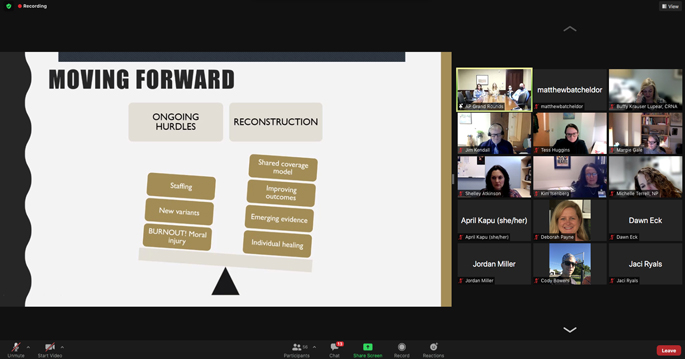
by Matt Batcheldor
The experience of caring for COVID-19 patients for nearly two years was the focus of the kickoff presentation of the VUMC Advanced Practice Grand Rounds, the monthly educational series organized by the Office of Advanced Practice.
Advanced practice nurses, physician associates and hospital leaders from around Vanderbilt University Medical Center gathered over Zoom on Jan. 18 for the session, “Navigating a Pandemic, Our Team’s Journey,” presented by Lisa Flemmons, MSN, APRN, ACNP-BC, assistant in Medicine in the Medical Intensive Care Unit (MICU). She was joined by her advanced practice team in the MICU.
The team described the uncertain early days of the pandemic, creating a COVID-specific unit, learning to care for patients with a novel disease and navigating several patient surges. As of mid-January, VUMC had cared for 1,142 patients critically ill with COVID-19, about half of whom required mechanical ventilation, Flemmons said. About 72 of them were also on ECMO, or extracorporeal membrane oxygenation, a life-sustaining mechanical system that temporarily takes over for the heart and lungs of critically ill patients, allowing them to rest and recover. These ECMO patients were the sickest of the sick.
Flemmons described several phases of the pandemic thus far — the preparation, the honeymoon period in which the community came together, the subsequent feelings of abandonment by the community as the human toll grew, to now — the rebuilding period into a new normal.
“This is really when my team started to feel the reality of those losses and kind of began its journey to ‘this is our new life,’” Flemmons said.
Olivia Kirkpatrick, MSN, APRN, a nurse practitioner in the MICU, recalled going on maternity leave right before COVID-19 struck Tennessee, then returning to an entirely different job.
“When I think on that time, the standout things for me include the new role that we were tasked with regarding the triage for the Southeast region, the sickest patients, essentially,” she said.
MICU Nurse Practitioner Dan Ford, MSN, APRN, recalled “the constant feeling that you weren’t able to manage patients the way that you previously had. Your whole focus was to put out fires. So, you would literally run from one room, and one… patient to another and managing that and peri-arrests and arrests.” Staff were worried about whether they would contract COVID-19.
Meanwhile, family participation in decision-making, a pillar of MICU care, was changed because visitors were initially not allowed in the COVID unit. Nurse practitioners and physician associates instead were limited to giving families a call once a day with an update, and sometimes using a video call at a patients’ bedside as they were dying.
“Our nurses were amazing in helping implement the Facetime and Zoom calls and the family members could at least be there in some capacity and feel like they were present in someone’s passing,” said MICU Nurse Practitioner Wren Sherrill, MSN, APRN, “but talk about a complete change in the way we practice.”
Sherrill said the day-in, day-out of patient care took a toll on staff, many of whom worked overtime due to staffing shortages.
“The high acuity, high census, high mortality, on top of us having personal connections, and then feeling abandoned by our community, it hit an all-time low here, I think,” she said.
In time, nurses saw some relief. Visitor policies changed. More nurses were hired. Volunteers from other units came to staff the COVID unit. Vaccines and treatments were invented. By the middle of 2021, a plan was put into place to distribute the burden of the sickest COVID patients to other VUMC intensive care units.
“That’s when we had a breather, and I think we all sat down and could just start doing some self-reflection and dealing with the feelings that we had kind of pushed aside,” Flemmons said.
Flemmons ended the presentation with a message of hope, thanking the greater Vanderbilt community that came together during an unprecedented time.
“We’re having some improved outcomes, there’s new emerging evidence still every single day and some treatments that are promising,” she said. Meanwhile, “we’re all kind of dealing with our own individual healing.”
Buffy Krauser-Lupear, DNP, APRN, CRNA, director of Professional Development in the Office of Advanced Practice, was among many who were moved by the MICU nurse practitioners’ stories.
“I know that you have been through a lot, and I’m so happy that you’re here to share with us today, your journey,” she said. “Just know that we love you and we are so grateful for everything you all have done. Thank you.”
During the kickoff session, the 2022 Advanced Practice Ambassador Award was presented to Jim Kendall, LCSW, CEAP, manager of VUMC Work-Life Connections-EAP (the Employee Assistance Program). The award honors non-advanced practice providers for their contributions to the profession.
Go here for more information about the Office of Advanced Practice.